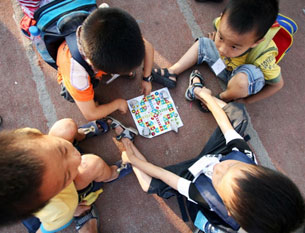China to register all children
| Publisher | Radio Free Asia |
| Publication Date | 14 June 2010 |
| Cite as | Radio Free Asia, China to register all children, 14 June 2010, available at: https://www.refworld.org/docid/4c2b5e2926.html [accessed 26 May 2023] |
| Disclaimer | This is not a UNHCR publication. UNHCR is not responsible for, nor does it necessarily endorse, its content. Any views expressed are solely those of the author or publisher and do not necessarily reflect those of UNHCR, the United Nations or its Member States. |
2010-06-14
Children born 'off the books' will be counted in the country's next census.
 Children play at a special school for children of migrant workers in Fujian province, Sept. 22, 2009. AFP
Children play at a special school for children of migrant workers in Fujian province, Sept. 22, 2009. AFP
HONG KONG – Authorities in the Chinese capital have said that children born outside strict family planning quotas or out of wedlock will have an amnesty on household registrations ahead of a nationwide census in November.
The census, the sixth nationwide population count under the ruling Communist Party, will run from November 2010 to June 2012, official media reported.
"People who violated family planning policies can apply for household registration by taking the opportunities of the census," the official English-language China Daily newspaper quoted Gu Yanzhou, deputy director of the Beijing Statistic Bureau, as saying.
He said census officials would not pass on such information to family planning departments to provide a basis for fines, which are also commonly levied on mothers giving birth outside the rules.
Experts said the benefits appear to be extended across the nation, but don't represent a step forward for the rights of China's citizens.
"This doesn't represent a step forward," said Deng Xiaogang, associate professor with the department of sociology at the University of Massachusetts in Boston.
"It is the correction of illegal actions."
Beijing-based lawyer Cheng Hai, who specializes in China's household registration, or "hukou," system agreed.
"According to our household registration law and the marriage law, children born out of wedlock have the same rights as those born to a married couple," Cheng said.
"Any child can be registered by any of its relatives."
"The policies of the past few decades in which children born out of wedlock have been refused household registration are in fact contravening this rule; these are policies put into practice at a local level."
"Any child born in China should be able to get a household registration here."
Glaring inequities
China's "hukou" system has come under increasing fire in recent years because it imposes striking inequalities on tens of millions of rurally registered migrants who travel to the cities in search of work.
When they get there, they find they have no access to schooling for their children, health insurance, or social assistance programs, because these are all linked to a person's place of registration, or hukou.
"So many things require a registration book or a national identity card, such as getting a child into school, health insurance, social assistance, going on holiday, and getting a job," Cheng said.
"If you don't have a registration book, you can't get a national identity card."
Cheng said that while there are no figures for the number of affected children nationwide, he thinks the problem is "pretty widespread".
Deng said the need for accurate figures is the reason for the "amnesty."
"A national population policy needs to have accurate figures before it can design an appropriate strategy," he said.
"Population censuses are extremely important.... In China, which has such a vast territory and such a huge population, it truly is a massive undertaking.
"It's a trade-off," Deng said.
"You want information about this group of people, [so] you have to let them register ... of course they will be happy to take the opportunity."
Public services
Official figures estimate that around 30 percent of urban residents in China have rural registrations that limit their access to public services.
However, the difficulties faced by migrant workers in getting schooling for their children in Beijing have been struck off the list of permissible news items for traditional media and online news providers to report on.
Earlier this year, editors from 13 different regional state-run newspapers were handed official warnings after they published a joint editorial calling for an end to the hukou system, which they said discriminates against rural residents who move to large cities to work.
Chinese premier Wen Jiabao pledged in his speech to China's National People's Congress (NPC) in March to abolish some restrictions on migrant workers in smaller towns and cities, but stopped short of abolishing the hukou system, saying the authorities would take a "step-by-step" approach.
And in the run-up to the annual meetings of the National People's Congress (NPC) and the Chinese People's Political Consultative Conference in Beijing this month, top law enforcement official Zhou Yongkang called for the abolition of internal controls on migration between China's cities and countryside.
Original reporting in Mandarin by Tang Qiwei. Mandarin service director: Jennifer Chou. Translated from the Chinese and written in English by Luisetta Mudie. Edited by Sarah Jackson-Han.
Link to original story on RFA website
